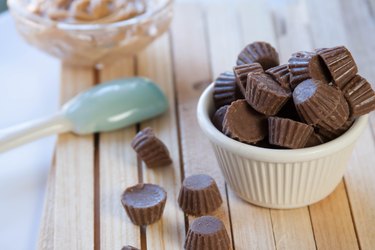
Reese's Peanut Butter Cups are gluten-free except for seasonal items and unwrapped minis. While an array of other candy varieties are gluten-free too, many others aren't.
A quick refresher: A gluten-free diet doesn't contain the protein gluten, which is found in barley, rye, wheat and a cross between rye and wheat called triticale, per the Mayo Clinic. Avoiding gluten is needed to manage the symptoms of various conditions — primarily celiac disease and non-celiac gluten intolerance.
Video of the Day
Video of the Day
Tip
All of Reese’s Peanut Butter Cups are gluten-free with the exception of unwrapped minis and seasonal candies. Reese's Eggs aren't gluten-free.
Gluten-Free Candy
How do you know if a specific candy is gluten-free? First, check for a gluten-free symbol on the packaging. If your candy doesn't carry that label, try checking the manufacturer's website.
Beyond Celiac and the Celiac Disease Foundation put out lists of gluten-free candy on their websites. You can also check Hershey's gluten-free list. Some manufacturers may not publish a list, but you can contact them directly.
Another way to check whether a candy contains gluten involves reading the label carefully. It can, however, be hard to recognize gluten-free ingredients. Most people know to look for the gluten-containing grains of wheat, rye and barley; but sometimes wheat is called other names. In addition, a candy may contain malt vinegar or a protein derivative of a grain.
Reese's Pieces are all gluten-free except for the Eggs, reports the Celiac Disease Foundation. Other gluten-free candies, per Beyond Celiac, include:
- Hershey's Milk Chocolate Kisses
- Snickers Bars
- Milky Way Caramel Bars (not the original Milky Way Bars)
- Tootsie Rolls
- M&Ms (except pretzels and seasonal items)
- Butterfingers
- Jelly Belly Beans
- Some varieties of York Peppermint Patties
- Ring Pops
Tip
The lists of gluten-free candy include many exceptions among very similar products put out by the same company. Also, a company will sometimes make a candy gluten-free in one size while making other sizes of the same candy with gluten. When checking the gluten-free lists, be careful to note all the exceptions.
Healthy Alternative to Candy
Even if a candy is gluten-free, that doesn't mean it's a healthy treat or dessert.
According to the USDA, a package of Reese's Peanut Butter Cups has 210 calories, 13 grams of fat and 21 grams of sugar. It also contains peanuts, which are an allergen.
Most other candy varieties are also high in calories, fat and sugar.
Fruit is a deliciously sweet treat that is naturally gluten-free. It's also rich in fiber, vitamins and minerals. Consider exchanging candy for fruit when it comes to daily snacking and saving the candy for an occasional treat.
Related Reading
Tips for Avoiding Gluten
When reading labels, some gluten-containing ingredients aren't obvious. Be aware of the different varieties of wheat such as einkorn, durum, emmer, spelt and kamut, recommends the Mayo Clinic.
Likewise, wheat flours have different names, but they all contain gluten: These include semolina, farina, self-rising flour, enriched flour and graham flour.
If a label includes malt or brewer's yeast, it also contains gluten, per the Gluten Intolerance Group.
Look for a gluten-free label, because the Food and Drug Administration requires that these claims meet a clear standard. Another reliable sign to check for is a third-party gluten-free certification.
- Celiac Disease Foundation: "Gluten-Free Candy List"
- Beyond Celiac: "Is Candy Gluten-Free?"
- Mayo Clinic: "Gluten-Free Diet"
- Celiac Disease Foundation: "Gluten-Free Foods"
- Harvard Health Publishing: "Going Gluten-Free Just Because? Here’s What You Need to Know"
- U.S. Food and Drug Administration: "Gluten and Food Labeling"
- The Hershey Company: "Gluten Free"
- USDA Branded Food Products Database: "Reese's, Cups, Peanut Butter"